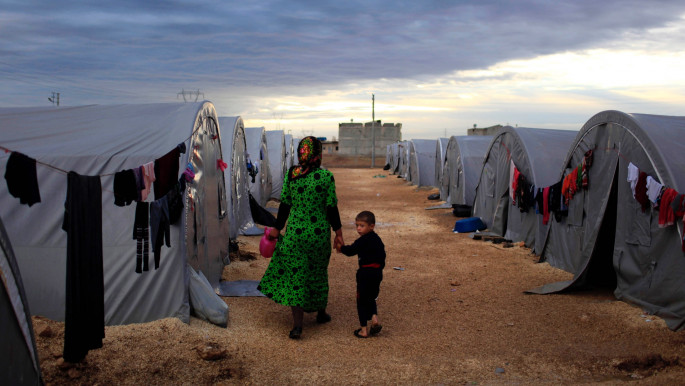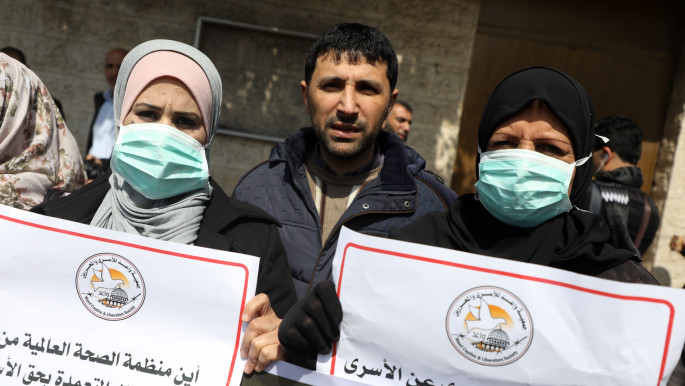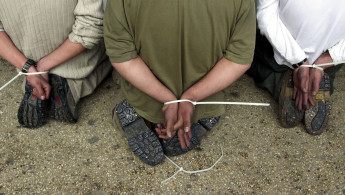Middle East regimes are freeing inmates as coronavirus spreads. But political prisoners remain behind bars
While some Middle East regimes have commuted jail terms or temporarily released prisoners, countless political detainees remain behind bars amid the fast-spreading coronavirus outbreak.
A number of countries in the MENA region have conditionally released detainees in an effort to contain the spread of Covid-19 inside jails, where cramped and unsanitary conditions put prison populations at high risk of virus contagion.
The Euro-Mediterranean Human Rights Monitor warned in a recent statement that an outbreak of the novel coronavirus among prisoners in jails in the Middle East would "lead to a devastating tragedy in no time", pointing out that prisons in the region "are among the most vulnerable areas to the spread of the coronavirus as they are often overcrowded and lack proper hygiene and infrastructure".
Increasing appeals to raise awareness of the plight of prisoners are bringing due attention to their vulnerability and the urgent need to release people in detention, including political prisoners who, in many instances, have been excluded from coronavirus mitigation measures.
Below are some of the countries that have taken measures as the death toll from Covid-19 continues to rise across the region.
Iran
Iranian authorities extended a temporary release for some 100,000 prisoners in late March as a health ministry official said the death toll at the time from the coronavirus had increased to 2,640.
The decision came after authorities earlier in March said it had temporarily released 85,000 detainees from prison, including political prisoners, as part of the government's efforts to combat the spread of the virus. Among them was British-Iranian aid worker Nazanin Zaghari-Ratcliffe.
 |
Amnesty International believes hundreds of prisoners of conscience remain in Iran's prisons, including human rights defenders, journalists, and peaceful protesters |  |
Initially, the Iranian regime announced they would free 70,000 prisoners, however it was subsequently criticised for excluding political detainees.
Iran is one of the hardest hit countries in the region, with an outbreak that has seen more than 60,000 cases and over 3,700 deaths.
Amnesty International believes hundreds of prisoners of conscience remain in Iran's prisons, including human rights defenders, journalists, peaceful protesters, and others detained solely for expressing their rights to freedom of expression, association and/or assembly.
Read more: The NHS is in crisis, and black and brown communities are disproportionately paying the price
In a statement, the UN special rapporteur on human rights in Iran, Javaid Rehman, said that "recent reports indicate that the Covid-19 virus has spread inside Iranian prisons".
Mansoureh Mills, Iran Researcher at Amnesty International, expressed concern that the Iranian authorities have failed to sufficiently protect prison populations from the spread of coronavirus.
 |
|
| Read more: For Middle East refugees, social distancing is a privilege few can afford |
"At the best of times, many of Iran's prisons have detention conditions that fall far short of international standards, including with respect to overcrowding, poor ventilation, limited hot water during the winter season, inadequate food, insufficient beds and insect infestations," she said.
The researcher stated that prisoners' families have called on Iran's State Prison Organization to "regularly disinfect" detention centres, "provide masks and hand sanitisers" to prisoners, "quarantine those suspected of having the virus", and "grant prison leave" to as many prisoners as possible.
In Shahr-e Rey prison, two detainees reportedly died from Covid-19 in solitary confinement last week after being denied medical care and admittance to hospital. In Urumieh prison, over a hundred detainees in one section went on hunger strike in early March at the shortage of sanitary products despite suspected cases of coronavirus among convicts.
There have also been reports of coronavirus in other detention facilities including Ahvaz central prison and Evin prison in Tehran. Several prisoners of conscience went on hunger strike in Evin facility to protest at the authorities' continued refusal to grant them prison leave.
"We are calling on the Iranian authorities to immediately and unconditionally release all prisoners of conscience," Mills urged.
"We are also urging them to consider releasing other prisoners, especially pre-trial detainees and those who may be more at risk from the virus, and take necessary measures to protect the health of all prisoners, including equal access to testing".
 |
According to rights groups, tens of thousands are held captive in Egypt because of their political opinions, deprived of their most basic rights |  |
Egypt
Egypt's State Security Prosecution ordered the release of 15 activists on 19 March amid demands to set thousands of prisoners free to prevent the spread of Covid-19 among inmates. Those included three key opponents of President Abdel Fattah al-Sisi.
The day before, the Egyptian government arrested four prominent female activists protesting to seek the freedom of unfairly detained prisoners over fears of the new virus. The women were released on bail after hours of detention. Three of them are family members of jailed high-profile activist Alaa Abdel Fattah.
"Instead of releasing people unjustly detained, the Egyptian authorities are silencing activists and relatives who speak up," Joe Stork, deputy Middle East and North Africa director at Human Rights Watch, said after the arrests. "Families are right to be concerned over Covid-19 risks, and the authorities should listen."
Read more: Will coronavirus cancel Ramadan?
Human rights organisations, civil society associations and political groups have made multiple calls for the urgent liberation of prisoners from the country's overcrowded detention facilities.
National campaign groups such as Free Zyad Elelaimy and Free Ramy Shaath are also calling for the release of detainees in pre-trial detention, people detained for non-violent offences and prisoners with health conditions.
According to rights groups, tens of thousands are held captive in Egypt because of their political opinions, deprived of their most basic rights.
 |
|
| A protest in solidarity with Palestinian prisoners in Israeli jails outside the Red Cross Office in Gaza City. [Getty] |
Egypt's prisons are notorious for their inhumane and unsafe conditions. Access to running water is not guaranteed, toilets are filthy, and proper ventilation and daylight are scarce. Personal hygiene items such as soap, toothbrushes, toothpaste, and toilet paper can be confiscated.
"The coronavirus epidemic adds serious concern. It's extremely worrying that, under these conditions, if a disease enters a prison population it's very likely to spread very quickly even before authorities are able to identify infections and put the infected into quarantine," noted Hussein Baoumi, Egypt Researcher at Amnesty International.
Concerns have increased over the spread of Covid 19 after prison authorities banned all visits on 10 March, with several families reportedly urging authorities to allow phone calls with their imprisoned relatives as they cannot have any information from or about them.
Baoumi reiterated Amnesty's call on Egyptian authorities to free all people who remain arbitrarily detained - namely prisoners of conscience - and held in prolonged detention, as well convicts who are at risk due to old age or underlying medical conditions, and those charged with misdemeanours.
"Many of these people shouldn't be imprisoned in the first place. Now the current epidemic is threatening the lives of people inside prison and outside too," he underscored.
As of 7 April, the number of confirmed cases of coronavirus stands at 1,322.
 |
There are over 5,000 Palestinian prisoners, including 180 children, 700 patients, at least 41 female prisoners and dozens of elderly inmates, held in 23 Israeli jails and custody centres. |  |
Palestine
The Palestinian Prisoners' Society (PPS) launched a petition on 31 March calling for international intervention to secure the release of over 1,000 Palestinian detainees from Israeli prisons due to coronavirus fears. These include elderly, female and minor prisoners and some 35 others suffering from critical illness.
The petition was motivated by great concerns about the fate of the prisoners, and failure by the Israeli Prisons Service (IPS) to provide proper health protection to ensure detainees are able to face the epidemic.
It has failed to reduce overcrowding as well as to sterilise prisons, sections, and cells on a regular basis, nor it has provided prisoners with proper hygiene and sanitation products, or adopted other protective measures inside prison premises.
Read more: How has coronavirus impacted conflicts in the Middle East?
Prisoner's rights group Addameer noted that IPS has banned visits to Palestinian prisoners by family members and lawyers since the outbreak of the virus in Israel. It has also barred Palestinian prisoner's legal representatives from direct communication only allowing phone calls with them, which means that they cannot accurately assess the health and safety of the detainees.
 |
|
| Read more: Syria Weekly: Coronavirus outbreak sparks more fears of epidemic |
According to the PPS, four Palestinian prisoners in the Megiddo Israeli prison may have contracted Covid-19 through contact with an Israeli interrogator who had been diagnosed with the disease. They were sent to quarantine at the al-Ramleh prison clinic.
Families and legal organisations representing the four prisoners have been urging for confirmation that they are safe and not infected. As of 24 March, based on information gathered by Palestinian rights groups, the convicts were still in isolation, their temperature was being taken twice a day, but they had not received coronavirus testing or any other medical test.
"In a confined environment, where people cannot practice any form of social distancing, whatever viral infection poses a real danger. This is especially true for Palestinian prisoners who have voiced medical neglect as a very common complaint long before the coronavirus came on the scene," Charlotte Kates, International Coordinator of Samidoun, a grassroots international network that works to free Palestinian prisoners from Israeli jails, said.
Reports of coronavirus cases in Israel's detention facilities have emerged since last month with rights groups warning that poor conditions and medical negligence in prisons may aggravate the danger of an outbreak.
In Ramleh prison, detainees have reportedly been put into quarantine after coming into contact with Israeli prison officers who were suspected of being exposed to the virus.
Two Israeli policemen in Ofer prison and another in the Nitzan prison were recently infected with the coronavirus.
 |
There is a complete differential treatment between Israeli and Palestinian prisoners |  |
There are over 5,000 Palestinian prisoners, including 180 children, 700 patients, at least 41 female prisoners and dozens of elderly inmates, held in 23 Israeli jails and custody centres.
More than 9,000 cases of infection and 59 deaths have been reported in Israel.
The overcrowding, unhealthy conditions, poor nutrition, coupled by the downsized medical staff, show the Israeli regime's policy of medical negligence in jails putting prisoners at serious risk of the virus spreading.
Palestinian prisoners in Israeli detention centres have threatened to launch a hunger strike if measures to protect them against the virus are not implemented. Two weeks ago, detainees in several prisons reportedly returned their meals for two days.
Amid the threat of Covid-19 transmission in the prison communities, Tel Aviv has refused to release any Palestinians, not even those with critical health conditions, whereas it has approved the release of hundreds of Israeli offenders to curb the virus spread.
"There is a complete differential treatment between Israeli and Palestinian prisoners", Kates emphasised, "there's much concern among Palestinians for their detained loved ones simply because Israel has not taken any precautions to safeguard their health".
Alessandra Bajec is a freelance journalist currently based in Tunis.
Follow her on Twitter: @AlessandraBajec


![President Pezeshkian has denounced Israel's attacks on Lebanon [Getty]](/sites/default/files/styles/image_684x385/public/2173482924.jpeg?h=a5f2f23a&itok=q3evVtko)



 Follow the Middle East's top stories in English at The New Arab on Google News
Follow the Middle East's top stories in English at The New Arab on Google News


